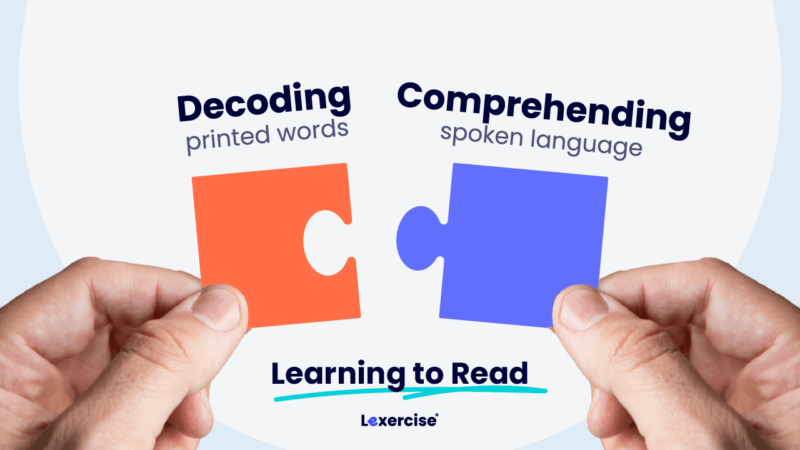Understanding the Simple View of Reading: A Parent’s Guide
Written by Sandie Barrie Blackley, MA/CCC
Published on April 1, 2025
For many parents and educators, the “Simple View of Reading” might feel anything but simple. This theoretical model, proposed by Wesley Hoover and Philip Gough in 1986, breaks down the complex process of learning to read into two essential components: decoding (word recognition) and language comprehension. Both are necessary for skilled reading. If one component is weak, reading and understanding text is compromised.
So, what exactly are these two components, and how can understanding them help you support a struggling reader?
The Two Components of the Simple View of Reading
- Decoding (Word Recognition)
Decoding is the process of converting a sequence of written letters to speech sounds and then blending them to pronounce the printed word. To master decoding a child must learn that:
- Words can be segmented into sequences of speech sounds (phonemes).
- Letters can represent speech sounds.
- A printed word can be read by pronouncing its letter-sound sequence smoothly, in a blended fashion.
- Language Comprehension (Listening Comprehension)
Listening comprehension is the ability to understand spoken language. Children begin to understand spoken language as infants. By preschool:
- They understand the meaning of words used in daily conversations.
- They understand sentences, so they can follow directions and participate in conversations.
Listening comprehension allows students to learn from others through conversations, storytelling, and listening to books read aloud.

Both of these components must function well—individually and together—for reading success. Difficulties in either decoding or listening comprehension can lead to serious reading challenges.
Common Reading Challenges
Children with difficulties in decoding are often diagnosed with dyslexia, a term most parents are familiar with. Dyslexia affects approximately 15% to 20% of students and makes it hard for individuals to recognize and spell written words.
On the other hand, Specific Language Impairment (SLI) (sometimes called Developmental Language Disorder) is less well-known, yet just as impactful. Affecting about 5% to 7% of students, SLI may impact both listening comprehension and decoding. Even when a student with SLI can decode the words in a passage they may still struggle to understand what they’ve read due to weak listening comprehension.
Interestingly, both dyslexia and SLI tend to run in families, with genetic research indicating that up to 40% of affected children have a parent or sibling with similar difficulties.
How the Simple View of Reading Helps Guide Treatment
The Simple View of Reading has revolutionized how reading difficulties are diagnosed and treated. Before this model was widely understood, reading interventions often took a one-size-fits-all approach, focusing heavily on rote memorization for word recognition, regardless of whether the child’s underlying problem was decoding or listening comprehension.
Today, evidence-based structured literacy approaches, including methods like Orton-Gillingham, address both decoding and listening comprehension. These methods provide individualized, targeted instruction tailored to the student’s specific strengths and weaknesses in decoding and/or listening comprehension.
The key insight of the Simple View is this: reading interventions must be personalized to address the unique challenges a student faces. A child with dyslexia will benefit most from explicit instruction focused on word structure, including phonics, to improve decoding, while a child with SLI may need a focus on vocabulary and sentence structure. For those with mixed difficulties, interventions must be even more nuanced.
Why Early Intervention is Critical
Research over the past 30 years has overwhelmingly supported the effectiveness of early, individualized interventions based on the Simple View of Reading. As noted in the Lexercise Clinician’s Manual, “Recent research suggests that the underlying deficits in dyslexia may vary among individuals, highlighting the need for treatment that focuses on individual patterns rather than generic programs.”
The earlier these reading challenges are identified and addressed, the more successful interventions tend to be. Early intervention can significantly reduce the frustration children experience and help prevent future academic struggles.
If you notice your student is struggling with reading and spelling but you aren’t sure where the trouble lies, have a look at the free Lexercise online learning disability tests. They are designed to help you sort out how much of the trouble might be due to weak listening comprehension and how much due to weak decoding and spelling. This is a vital first step in securing the kind of help that will turn a word-challenged child into a skilled reader.
If you have questions about dyslexia or specific language impairment, please contact us to discuss your child’s options or schedule a free consultation with one of our reading specialists.
Improve Your Child’s Reading
Learn more about Lexercise today.
Schedule a FREE
15-minute consultation



Leave a comment